Items filtered by date: May 2025
Stretching Exercises for Achilles Tendonitis
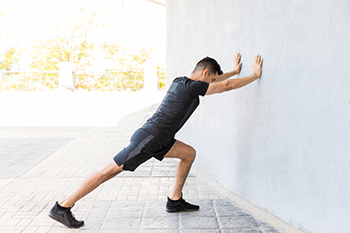
Achilles tendonitis involves inflammation in the tendon that connects the calf muscles to the heel bone, often the result of overuse or repetitive strain. A podiatrist may recommend specific stretching and strengthening exercises to help relieve tension, improve mobility, and support long-term recovery. Calf stretches, such as the runner’s stretch or toe-to-wall stretch, can reduce tightness and ease strain on the Achilles tendon. Another useful stretch is the heel drop, which involves slowly lowering the heel below a step to gently lengthen the tendon. Once stretching is tolerated, strengthening exercises like seated heel raises and controlled resistance band movements may be introduced to reduce the likelihood of reinjury. These exercises aim to support the structures surrounding the Achilles tendon and protect it during activity. A podiatrist can evaluate the severity of the condition and determine if additional support, like custom orthotics or surgery, is needed. If you are experiencing Achilles tendon pain, it is suggested that you schedule an appointment with a podiatrist for appropriate treatment, which may include targeted exercises.
Achilles tendon injuries need immediate attention to avoid future complications. If you have any concerns, contact Steven Lashley, DPM of Florida. Our doctor can provide the care you need to keep you pain-free and on your feet.
What Is the Achilles Tendon?
The Achilles tendon is a tendon that connects the lower leg muscles and calf to the heel of the foot. It is the strongest tendon in the human body and is essential for making movement possible. Because this tendon is such an integral part of the body, any injuries to it can create immense difficulties and should immediately be presented to a doctor.
What Are the Symptoms of an Achilles Tendon Injury?
There are various types of injuries that can affect the Achilles tendon. The two most common injuries are Achilles tendinitis and ruptures of the tendon.
Achilles Tendinitis Symptoms
- Inflammation
- Dull to severe pain
- Increased blood flow to the tendon
- Thickening of the tendon
Rupture Symptoms
- Extreme pain and swelling in the foot
- Total immobility
Treatment and Prevention
Achilles tendon injuries are diagnosed by a thorough physical evaluation, which can include an MRI. Treatment involves rest, physical therapy, and in some cases, surgery. However, various preventative measures can be taken to avoid these injuries, such as:
- Thorough stretching of the tendon before and after exercise
- Strengthening exercises like calf raises, squats, leg curls, leg extensions, leg raises, lunges, and leg presses
If you have any questions please feel free to contact our office located in Boynton Beach, FL . We offer the newest diagnostic tools and technology to treat your foot and ankle needs.
Symptoms and Treatment of Athlete's Foot
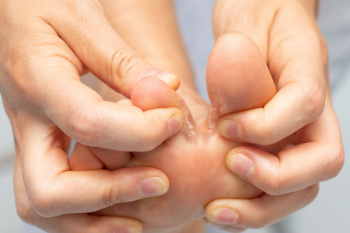
Athlete's foot is a fungal infection that affects the skin on the feet, especially between the toes. Athlete’s foot can happen to anyone, not just athletes. Symptoms may include itchy, white or scaly patches, redness, or skin that cracks and becomes sore. In some cases, blisters may appear, and the infection can spread to the soles or toenails. If left untreated, the infection can worsen or spread to other parts of the foot. A podiatrist can diagnose athlete's foot through a physical exam and may take a skin sample, if needed. Depending on the severity, a podiatrist may prescribe medicated creams, antifungal tablets, or, in rare cases, surgery if the infection affects deeper tissue or the nails. If you have an athlete's foot infection, it is suggested that you schedule an appointment with a podiatrist for immediate treatment.
Athlete’s Foot
Athlete’s foot is often an uncomfortable condition to experience. Thankfully, podiatrists specialize in treating athlete’s foot and offer the best treatment options. If you have any questions about athlete’s foot, consult with Steven Lashley, DPM from Florida. Our doctor will assess your condition and provide you with quality treatment.
What Is Athlete’s Foot?
Tinea pedis, more commonly known as athlete’s foot, is a non-serious and common fungal infection of the foot. Athlete’s foot is contagious and can be contracted by touching someone who has it or infected surfaces. The most common places contaminated by it are public showers, locker rooms, and swimming pools. Once contracted, it grows on feet that are left inside moist, dark, and warm shoes and socks.
Prevention
The most effective ways to prevent athlete’s foot include:
- Thoroughly washing and drying feet
- Avoid going barefoot in locker rooms and public showers
- Using shower shoes in public showers
- Wearing socks that allow the feet to breathe
- Changing socks and shoes frequently if you sweat a lot
Symptoms
Athlete’s foot initially occurs as a rash between the toes. However, if left undiagnosed, it can spread to the sides and bottom of the feet, toenails, and if touched by hand, the hands themselves. Symptoms include:
- Redness
- Burning
- Itching
- Scaly and peeling skin
Diagnosis and Treatment
Diagnosis is quick and easy. Skin samples will be taken and either viewed under a microscope or sent to a lab for testing. Sometimes, a podiatrist can diagnose it based on simply looking at it. Once confirmed, treatment options include oral and topical antifungal medications.
If you have any questions, please feel free to contact our office located in Boynton Beach, FL . We offer the newest diagnostic and treatment technologies for all your foot care needs.
Custom Orthotics For Ankle Stability
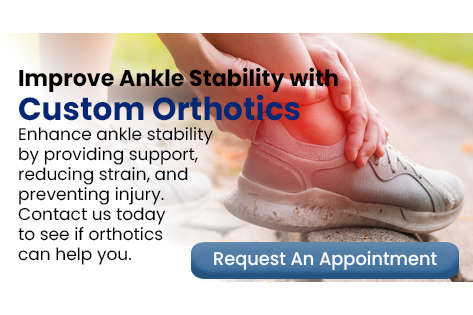
Step with assurance, thanks to enhanced ankle stability from orthotics! If you're active and on the move, Custom Orthotics are your ally for stronger, steadier ankles. They align your foot and ankle, reducing the risk of sprains and offering solid support for every stride. Don’t let instability hold you back. Try Custom Orthotics from our office, and discover unshakable confidence in every step!
Pros and Cons of Bunion Surgery
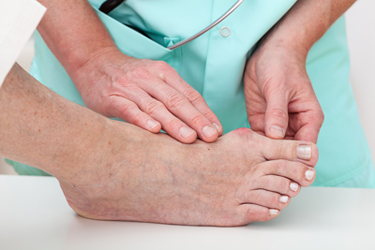
When bunions cause significant pain or disrupt everyday activities, surgery may be recommended after other treatment options have been attempted. A podiatrist can evaluate the severity of the bunion and explain whether surgery is warranted. Bunion surgery can offer pain relief, improved alignment, and better stability, but it also involves potential risks. Some surgical options involve removing bone, reshaping the joint, or fusing bones to limit movement and prevent the bunion from returning. Results can depend heavily on the severity of the bunion, the specific procedure used, and how well the foot heals. Risks include infection, nerve damage, joint stiffness, and the possibility that the bunion could recur. Some patients may also experience reduced toe flexibility or have problems wearing certain types of shoes following surgery. If bunions are interfering with your daily activities, it is suggested that you schedule an appointment with a podiatrist to find out if surgery is an option for you.
Foot surgery is sometimes necessary to treat a foot ailment. To learn more, contact Steven Lashley, DPM of Florida. Our doctor will assist you with all of your foot and ankle needs.
When Is Surgery Necessary?
Foot and ankle surgery is generally reserved for cases in which less invasive, conservative procedures have failed to alleviate the problem. Some of the cases in which surgery may be necessary include:
- Removing foot deformities like bunions and bone spurs
- Severe arthritis that has caused bone issues
- Cosmetic reconstruction
What Types of Surgery Are There?
The type of surgery you receive will depend on the nature of the problem you have. Some of the possible surgeries include:
- Bunionectomy for painful bunions
- Surgical fusion for realignment of bones
- Neuropathy decompression surgery to treat nerve damage
Benefits of Surgery
Although surgery is usually a last resort, it can provide more complete pain relief compared to non-surgical methods and may allow you to finally resume full activity.
Surgical techniques have also become increasingly sophisticated. Techniques like endoscopic surgery allow for smaller incisions and faster recovery times.
If you have any questions please feel free to contact our office located in Boynton Beach, FL . We offer the newest diagnostic and treatment technologies for all your foot and ankle needs.
Custom Foot Orthotics May Help Improve Stability in Older Adults
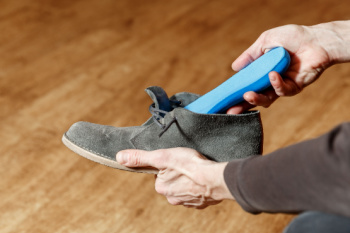
As people age, maintaining balance becomes increasingly important for reducing the risk of falls and promoting independence. Custom foot orthotics can play a valuable role in enhancing stability for older adults by improving foot alignment and providing support that promotes even weight distribution. Many balance issues stem from weakened arches, unstable gait, or improper foot mechanics, all of which can be addressed through personalized orthotic solutions. These devices help stabilize the foot and ankle, allowing for more confident and secure movement. The improved alignment also contributes to better posture and coordination. When tailored to the specific needs of the individual, custom orthotics can lead to increased comfort and greater mobility, making them a powerful tool in the pursuit of safe and active aging. If you are older and finding it difficult to maintain balance, it is suggested that you contact a podiatrist who may be able to provide a solution by prescribing custom foot orthotics.
Experience a transformative solution to heel pain and foot pain through the personalized benefits of custom orthotics and shoe inserts. If you’re grappling with the persistent agony of plantar fasciitis, these customized inserts are designed to alleviate the strain on the plantar fascia, providing targeted relief. Engineered to adapt to your unique foot anatomy, custom orthotics tackle not only plantar fasciitis but also general foot and heel pain, offering unparalleled support and comfort. Don’t let every step be a reminder of discomfort; step into a world of tailored well-being. Say farewell to the limitations imposed by heel pain and embrace the freedom of pain-free mobility. Invest in your foot health and redefine your daily stride with the transformative power of custom orthotics and shoe inserts, ensuring each step is a step towards lasting comfort.
If you have any questions please contact our office located in Boynton Beach, FL . We offer the newest diagnostic and treatment technologies for all your foot and ankle needs.
Types of Foot Arthritis
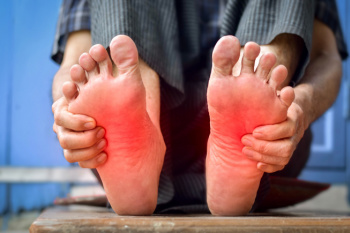
Foot arthritis is a condition where the joints in the foot become inflamed, leading to pain, stiffness, and decreased mobility. There are several types of arthritis that can affect the foot, including osteoarthritis, rheumatoid arthritis, and post-traumatic arthritis. Osteoarthritis results from wear and tear on the joints over time, while rheumatoid arthritis is an autoimmune disorder that causes the immune system to attack the joints. Post-traumatic arthritis can develop after an injury, such as a fracture or severe sprain. Symptoms include joint pain, swelling, tenderness, and difficulty walking. Risk factors for developing foot arthritis include aging, previous injuries, obesity, genetic predisposition, and repetitive stress on the feet. Early diagnosis and appropriate management are important to maintain mobility. If you have symptoms of foot arthritis, it is strongly suggested that you contact a podiatrist who can offer you effective relief tips, helping you to manage this condition.
Arthritis can be a difficult condition to live with. If you are seeking treatment, contact Steven Lashley, DPM from Florida. Our doctor can provide the care you need to keep you pain-free and on your feet.
Arthritic Foot Care
Arthritis is a joint disorder that involves the inflammation of different joints in your body, such as those in your feet. Arthritis is often caused by a degenerative joint disease and causes mild to severe pain in all affected areas. In addition to this, swelling and stiffness in the affected joints can also be a common symptom of arthritis.
In many cases, wearing ill-fitting shoes can worsen the effects and pain of arthritis. Wearing shoes that have a lower heel and extra room can help your feet feel more comfortable. In cases of rheumatoid arthritis, the arch in your foot may become problematic. Buying shoes with proper arch support that contour to your feet can help immensely.
Alleviating Arthritic Pain
- Exercises that stretch the foot can prevent further pain and injury and increase mobility
- Most of the pain can be alleviated with anti-inflammatory drugs, heat, and topical medications
- Massages can help temporarily alleviate pain.
It is best to see your doctor for the treatment that is right for your needs and symptoms. Conditions vary, and a podiatrist can help you determine the right method of care for your feet.
If you have any questions, please feel free to contact our office located in Boynton Beach, FL . We offer the newest diagnostic tools and technology to treat your foot and ankle needs.
